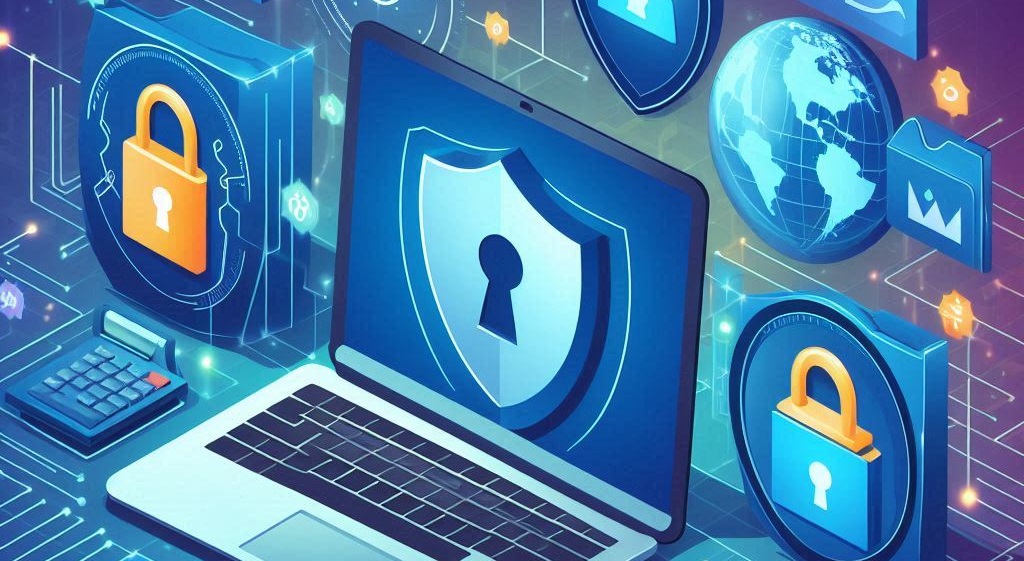In today’s digital world, small businesses are increasingly becoming targets for cyberattacks. While large corporations might have the resources to recover from such breaches, small businesses often face more severe consequences, including financial losses, reputational damage, and even closure.
According to the 2023 Data Breach Investigations Report, 28% of data breaches involve small businesses, highlighting the growing need for small enterprises to prioritize cybersecurity.
Read More: The Future of Remote Work: Top Technologies Transforming the Home Office Experience
For small businesses operating on limited budgets, it’s crucial to adopt cost-effective and practical cybersecurity measures.
In this article, we’ll outline five essential cybersecurity tips every small business should follow to protect their assets, data, and reputation.
1. Implement Strong Password Policies
Weak passwords are a common entry point for hackers, and a staggering number of businesses fail to enforce strong password protocols. Passwords such as “123456” or “password” are shockingly common and easy for cybercriminals to guess. A strong password policy is one of the simplest yet most effective ways to protect sensitive information and systems.
How to Improve Password Security:
- Enforce Strong Passwords: Require passwords to be at least 12 characters long, with a mix of uppercase letters, lowercase letters, numbers, and special characters.
- Multi-Factor Authentication (MFA): Implement MFA wherever possible. With MFA, users must provide two or more verification methods, such as a password and a fingerprint, or a password and a one-time code sent to their phone.
- Use Password Managers: Encourage employees to use password managers like LastPass or 1Password. These tools generate and store complex passwords, reducing the likelihood of weak or reused passwords across different platforms.
- Regular Password Updates: Establish a policy that requires employees to change their passwords every 60-90 days. Regularly updating passwords reduces the risk of compromised credentials being used over a long period.
By implementing these password policies, you can significantly reduce the likelihood of unauthorized access to your systems.
2. Keep Software and Systems Up to Date
Hackers often exploit vulnerabilities in outdated software and systems. If a hacker finds a loophole in your business software, they can quickly exploit it to gain access to sensitive data or install malware. Software developers regularly release patches and updates that fix these vulnerabilities, which is why it’s essential to keep all systems up to date.
Best Practices for System Updates:
- Enable Automatic Updates: Where possible, enable automatic updates for your operating systems, software, and applications. This ensures that you receive critical patches as soon as they are available.
- Use a Patch Management System: If your business uses several software platforms, managing updates manually can be time-consuming. Implement a patch management system to automate and track updates across your network.
- Update All Devices: It’s not just your computers that need updates. Smartphones, tablets, routers, and other IoT (Internet of Things) devices should also be kept up to date to avoid security vulnerabilities.
- Monitor End-of-Life Software: Regularly check for any software that is no longer supported by its developer. Unsupported software does not receive security updates and should be replaced with current, supported versions.
Maintaining up-to-date software is a simple yet crucial step to safeguard your business against common cyberattacks.
3. Educate Employees About Cybersecurity Best Practices
Employees are often the weakest link in a company’s cybersecurity defenses. Even the most sophisticated cybersecurity measures can be undone by human error, such as clicking on phishing emails or failing to recognize malicious links. This is why educating your staff about cybersecurity best practices is one of the most critical investments a small business can make.
Employee Cybersecurity Training Should Cover:
- Phishing Awareness: Train employees to recognize phishing attempts, which often come in the form of emails or messages designed to look legitimate but contain malicious links or attachments. Employees should be taught to verify the authenticity of these communications before clicking any links or downloading attachments.
- Safe Browsing Habits: Employees should know how to identify secure websites and avoid downloading files or software from suspicious or unverified sources.
- Data Protection: Teach staff how to securely handle and store sensitive business data, such as customer information and financial records. This includes guidelines on file encryption and proper storage.
- Incident Reporting: Encourage employees to report any suspicious activity, such as strange emails, pop-ups, or unusual computer behavior, to your IT or cybersecurity team immediately. Early detection can prevent more significant issues down the line.
Regular training sessions and updates on the latest cyber threats will empower your employees to act as your first line of defense against attacks.
4. Back Up Data Regularly and Securely
Data loss can happen for various reasons, from cyberattacks like ransomware to hardware failures or even human error. Having a reliable and secure backup system is vital for ensuring that your business can recover quickly and effectively if something goes wrong.
Data Backup Best Practices:
- Regular Backups: Schedule regular backups of all critical business data, including financial records, customer data, and operational files. The frequency of backups will depend on the nature of your business, but daily or weekly backups are ideal for most small enterprises.
- Use the 3-2-1 Backup Rule: This rule suggests keeping three copies of your data (the original and two backups), stored on two different types of media (e.g., a local hard drive and cloud storage), with one copy stored offsite or in the cloud. This ensures that your data is safe even if one of your backup locations is compromised.
- Encrypt Backup Data: Ensure that all backed-up data is encrypted to protect it from unauthorized access. Even if hackers manage to access your backups, encryption adds a layer of security that makes it difficult for them to retrieve usable information.
- Test Your Backup System: Periodically test your backup and recovery processes to ensure that data can be restored quickly and effectively in the event of a breach or failure.
Backing up your data not only protects your business from cyber threats but also provides peace of mind that you can recover from a crisis with minimal disruption.
5. Use Firewalls and Antivirus Software
Firewalls and antivirus software are essential tools in any cybersecurity strategy. Firewalls help to filter incoming and outgoing traffic, blocking unauthorized access to your network, while antivirus software detects and removes malware before it can cause harm.
Implementing Firewalls and Antivirus Protection:
- Enable Firewalls: All business networks should have a firewall enabled to monitor and control incoming and outgoing traffic. If your company uses cloud services, ensure that you also implement cloud-based firewalls to protect your data.
- Invest in Business-Grade Antivirus Software: While free antivirus solutions might be sufficient for personal use, businesses should invest in professional-grade antivirus software that provides comprehensive protection, including real-time scanning, malware removal, and advanced threat detection.
- Perform Regular Scans: Set up automatic virus scans to run on all devices within your network regularly. This will help detect any potential threats before they can cause significant damage.
- Layered Security Approach: Consider using multiple layers of defense, such as combining antivirus software with other security tools like intrusion detection systems (IDS) and endpoint detection and response (EDR) platforms. This layered approach makes it harder for hackers to breach your defenses.
By using firewalls and antivirus software, small businesses can prevent many common cyberattacks, such as viruses, malware, and unauthorized access to their networks.
Conclusion
In an increasingly digital world, cybersecurity is not a luxury—it’s a necessity. Small businesses are often prime targets for cybercriminals, making it crucial to adopt effective security measures.
By following the five essential cybersecurity tips outlined in this guide—enforcing strong password policies, keeping software up to date, educating employees, regularly backing up data, and using firewalls and antivirus software—you can significantly reduce the risk of a cyberattack.
While no security solution is foolproof, these practices provide a solid foundation for protecting your business’s assets, data, and reputation. Investing in cybersecurity today will help ensure that your small business is prepared to face the challenges of tomorrow’s digital landscape.








